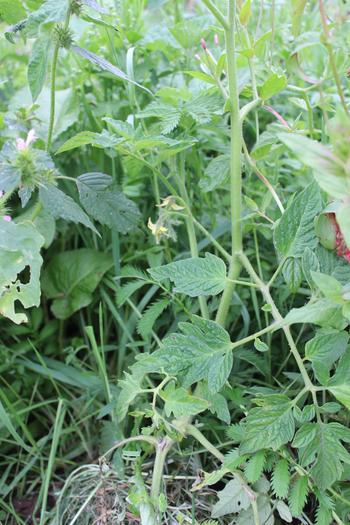

















 I have lots of trees and shady spots - veggie plants without fruit or mini fruit is common if I don't take steps to ensure enough sun exposure, water and minerals.
I have lots of trees and shady spots - veggie plants without fruit or mini fruit is common if I don't take steps to ensure enough sun exposure, water and minerals.



My Blog, Natural History and Forest Gardening
www.dzonoquaswhistle.blogspot.com
"Listen everybody, to what I gotta say, there's hope for tomorrow, if we wake up today!" Ted Nugent
"Suck Marrow" Henry D Thoreau




The ultimate goal of farming is not the growing of crops, but the cultivation and perfection of human beings. - Masanobu Fukuoka




"the qualities of these bacteria, like the heat of the sun, electricity, or the qualities of metals, are part of the storehouse of knowledge of all men. They are manifestations of the laws of nature, free to all men and reserved exclusively to none." SCOTUS, Funk Bros. Seed Co. v. Kale Inoculant Co.




 I hope my garden will do the same some day soon. I'm hoping to get chickens next spring but first have to decide where to put the coop, figure out how to keep in warm enough in winter and do the paddock thing. Our yard is good size but we also have two dogs so the coop will have to be inside the garden area.We will have only three chickens to start so I'm sure there will be plenty of space along the edge between the garden and the fence.I plan to plant that area with food for the chickens..comfrey ect. Hopefully I'll get that great fertilizer that you have and some good eggs too.
I hope my garden will do the same some day soon. I'm hoping to get chickens next spring but first have to decide where to put the coop, figure out how to keep in warm enough in winter and do the paddock thing. Our yard is good size but we also have two dogs so the coop will have to be inside the garden area.We will have only three chickens to start so I'm sure there will be plenty of space along the edge between the garden and the fence.I plan to plant that area with food for the chickens..comfrey ect. Hopefully I'll get that great fertilizer that you have and some good eggs too. 






The ultimate goal of farming is not the growing of crops, but the cultivation and perfection of human beings. - Masanobu Fukuoka




 Now I'll be sure to use my "greenhouse"(plastic cover with clear 2 lt bottles warmed by the sun underneath it) during the cold fall nights if need be to get my seed.
Now I'll be sure to use my "greenhouse"(plastic cover with clear 2 lt bottles warmed by the sun underneath it) during the cold fall nights if need be to get my seed.



Brenda
Bloom where you are planted.
http://restfultrailsfoodforestgarden.blogspot.com/

 6
6





How Permies works: https://permies.com/wiki/34193/permies-works-links-threads
My projects on Skye: The tree field, Growing and landracing, perennial polycultures, "Don't dream it - be it! "

 6
6




- Tim's Homestead Journal - Purchase a copy of Building a Better World in Your Backyard - Purchase 6 Decks of Permaculture Cards -
- Purchase 12x Decks of Permaculture Cards - Purchase a copy of the SKIP Book - Purchase 12x copies of Building a Better World in your Backyard
 5
5




Timothy Norton wrote:I am pretty good at getting volunteer tomatoes to grow in my raised garden beds year after year. The one thing that I lament is that they tend to be cherry tomatoes instead of nice big slicers. It is easier to clean up any tomato drops when they are big, but the small ones can slip by and their genetics get passed on.
My new 'policy' is that I will start slicers/plums indoors to plant outside and I will pass up on cherry tomatoes. Without a doubt, I still will be flush with cherry tomatoes at the end of the season because the volunteers that will sprout. I will thin them out so they are not too crowded when they pop up. I even will pluck them out of the ground and place them in a better spot with success. I'm not gentle and they still thrive.
 4
4




Invasive plants are Earth's way of insisting we notice her medicines. Stephen Herrod Buhner
Everyone learns what works by learning what doesn't work. Stephen Herrod Buhner





| I agree. Here's the link: http://stoves2.com |




